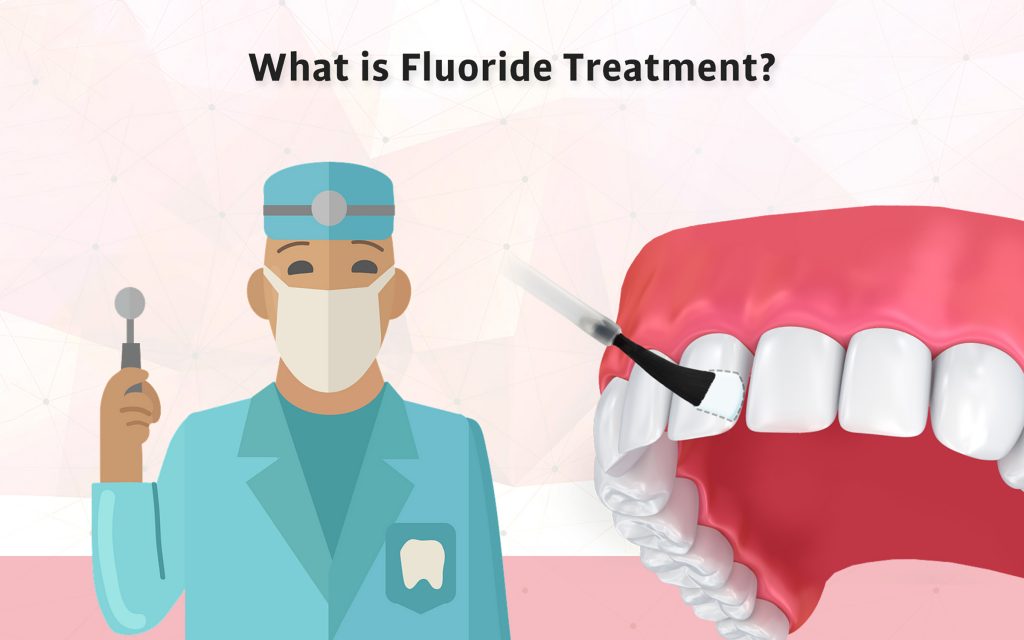
Tooth decay begins when the bacteria and sugars present in the mouth form acids that erode the tooth’s protective enamel. These acids cause minerals to be lost from the tooth’s enamel layer, a process called demineralization.
Fluoride helps strengthen the teeth through process called remineralization, where the mineral bonds to weakened areas of tooth enamel. It also disrupts acid production, helping to inhibit the process that leads to tooth decay. Fluoride can also reverse tooth decay damage in the early stages.
Fluoride can benefit people of all ages. Children who get fluoride treatments while their teeth are still forming will develop stronger permanent teeth, that are more decay-resistant over a lifetime. Adults who are particularly susceptible to tooth decay also benefit from fluoride application.
While fluoride can help reverse early tooth decay and prevent cavities, it cannot heal already formed cavities, therefore, it is a great and cost-effective strategy for maintaining dental health and preventing more expensive problems later on.
The most popular teeth whitening services also include fluoride.
Is fluoride available in any form?
Topical fluoride is present in low concentrations in most toothpaste and mouthwash. These are considered direct applications that you can buy over-the-counter.
For a higher fluoride concentration, such as in tablets and liquid fluoride supplements, you will require a prescription from your dentist, pediatrician, or family doctor.
When is the best time to start taking fluoride?
The recommended fluoride intake for infants and children (six months to sixteen years old) is 150 micrograms a day. Children’s primary and permanent teeth grow during this period, so fluoride is crucial. Fluoride is also beneficial for adults of any age.
Don’t we get enough fluoride already?
Because the benefits of fluoride are widely recognized, it is added in low concentrations to drinking water in many areas. It is also an ingredient in most toothpastes. However, children and individuals at increased risk of tooth decay can benefit from fluoride treatments that contain a much higher concentration of the mineral than is present in drinking water or in over-the-counter products. This type of treatment is only available from your dentist.
Who benefits from fluoride treatments?
Some conditions can also increase the risk of tooth decay, so additional fluoride treatments are beneficial for these people. So who could benefit the most from fluoride treatments?
- Children whose permanent teeth are not yet fully developed. Early exposure to fluoride strengthens permanent teeth before they even come out, leading to stronger teeth that are more decay-resistant for a lifetime.
- Individuals with dry mouth. Saliva neutralizes acid and protects the teeth. Those with conditions that cause dry mouth (such as diabetes, Sjogren’s syndrome and conditions that require radiation therapy) or who take certain medications (such as drugs for allergies, depression and high blood pressure).
- Those with a history of cavities who may be more susceptible to tooth decay. If you get cavities regularly, adding fluoride to your drinking water could help protect your teeth.
- Those with poor oral hygiene. Diseases of the teeth or conditions that limit one’s ability to brush or floss regularly can lead to plaque and tarter build-up, which causes tooth decay.
- Those with gum disease. By increasing the exposure of your teeth and tooth roots to bacteria, periodontitis, also known as gum disease, increases the chances of developing tooth decay. Periodontitis is an early stage of gum disease.
- Individuals with dental crowns and bridges have a higher risk of decay around the point where crowns meet the underlying tooth structure from such treatments.
- Individuals with braces. Braces can trap food, making it harder to floss and brush adequately, increasing the risk for tooth decay around the orthodontic brackets.
- Those with a sugary diet, who are more exposed to plaque and bacteria, which puts the enamel at greater risk.
- Bottled-water drinkers and others who don’t get enough fluoride.
Are fluoride treatments safe?
Fluoride treatments, also referred to as fluoride varnishing, have been supported by many clinical research studies. Fluoride has been in use for many years and has been approved as safe and effective by most major health and safety organizations. While excessive amounts of fluoride for long periods of time can harm the teeth, bones and, very rarely, cause more serious problems, we will determine whether you are a candidate for a fluoride treatment. The fluoride applied during a fluoride treatment is safe and effective.
In fact, past study conclusions favoring fluoride have been so compelling that the U.S. Preventative Services Task Force (USPSTF) recommends fluoride supplementation, also known as dietary fluoride supplementation, in geographic areas of the country where the water is not fluoridated.
The use of fluoride varnish (administered as part of dental prophylaxis) is recommended by the U.S. Preventative Services Task Force as well. The USPSTF found adequate evidence that fluoride varnish to the primary teeth (baby teeth) provides moderate benefit in preventing tooth decay.
What should you expect during your fluoride treatment appointment?
Fluoride treatments only required one appointment. We will put a flavored fluoride gel or foam into a tray that resembles a mouth guard. This tray will be kept in the mouth for one to four minutes, and you may spit the solution out after this time. You should avoid drinking, eating, smoking, or rinsing your mouth for 30 minutes. Some dentists use a different type of fluoride, called a varnish, which is painted on each tooth, rather than used with a tray.
Contact us if you have any questions about fluoride treatment or to request an oral health consultation.

